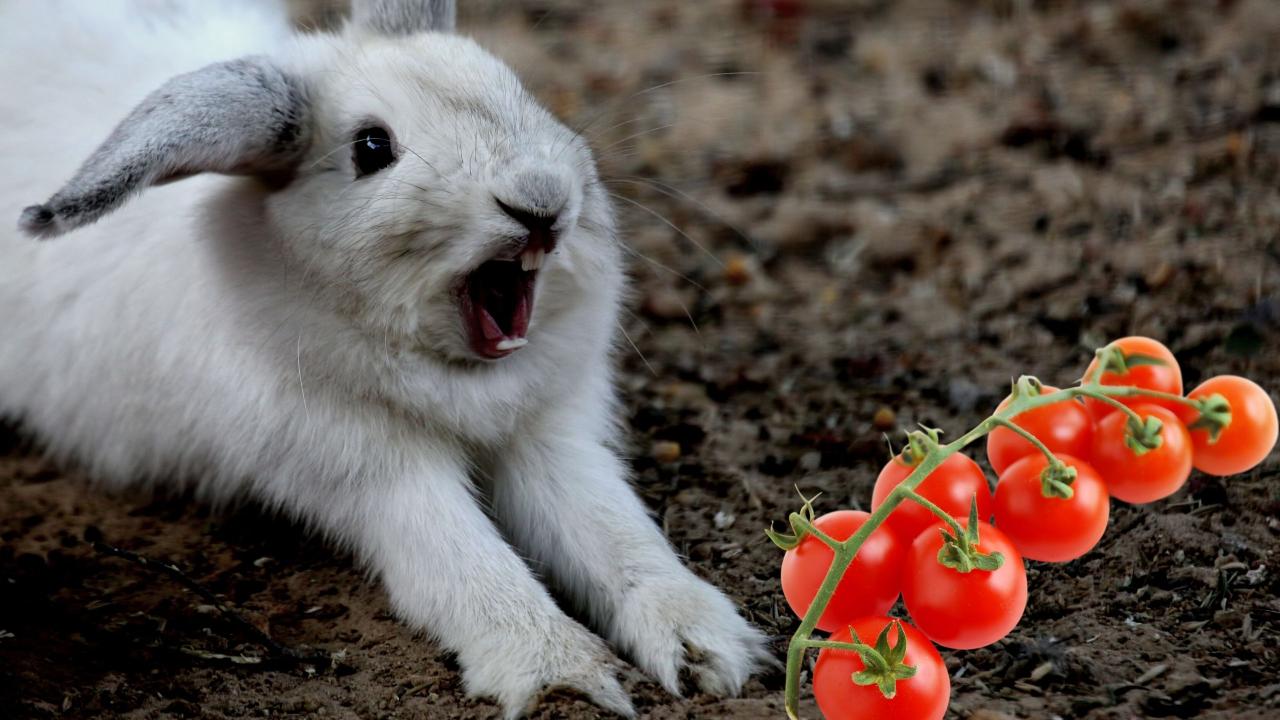Tomatoes, a beloved fruit (botanically speaking) often grace our salads, sandwiches, and summer gatherings. But can our furry, floppy-eared companions, rabbits, partake in this juicy delight? This article delves into the nutritional benefits and potential risks of tomatoes for rabbits, providing safe feeding guidelines and alternative vegetable options to ensure your bunny’s well-being.
Before we delve into the specifics, it’s crucial to note that rabbits have unique digestive systems, and introducing new foods should be done gradually to avoid digestive upset. Now, let’s explore the world of tomatoes and rabbits!
Nutritional Value of Tomatoes

Tomatoes, often classified as vegetables in culinary contexts, are botanically fruits that offer an impressive nutritional profile. They are a rich source of vitamins, minerals, and antioxidants, making them a valuable addition to a healthy diet.
Vitamins
Tomatoes are particularly rich in vitamin C, an essential nutrient for immune function, skin health, and collagen production. They also contain significant amounts of vitamin A, vital for vision, immune function, and cell growth. Additionally, tomatoes are a good source of vitamin K, which plays a crucial role in blood clotting and bone health.
Minerals
Tomatoes are a good source of potassium, an essential mineral for maintaining healthy blood pressure and electrolyte balance. They also contain magnesium, important for muscle function, nerve transmission, and bone health. Additionally, tomatoes provide some calcium, necessary for strong bones and teeth.
Antioxidants
Tomatoes are renowned for their high antioxidant content, particularly lycopene. Lycopene is a powerful antioxidant that has been linked to numerous health benefits, including reduced risk of chronic diseases such as heart disease and cancer. Tomatoes also contain other antioxidants, such as beta-carotene and vitamin E, which help protect cells from damage caused by free radicals.
Potential Risks of Tomatoes for Rabbits
While tomatoes can provide some nutritional benefits to rabbits, it is important to be aware of the potential risks associated with their consumption.
Tomatoes contain solanine, a toxic compound that can cause digestive issues in rabbits, especially when consumed in large quantities. Solanine can cause symptoms such as vomiting, diarrhea, and abdominal pain.
Allergic Reactions or Sensitivities
Some rabbits may also be allergic to tomatoes or develop sensitivities to the fruit. Symptoms of an allergic reaction can include skin irritation, itching, and difficulty breathing.
Safe Feeding Guidelines
To ensure the well-being of your rabbit while introducing tomatoes into its diet, it is crucial to follow specific guidelines. Understanding the appropriate serving size, frequency, and preparation methods is essential for safe consumption.
Serving Size and Frequency: Tomatoes should be given to rabbits sparingly, as they are high in sugar. A small slice of tomato, about the size of a quarter, can be offered once or twice a week as a treat.
Preparation
Before feeding tomatoes to your rabbit, it is important to prepare them properly:
- Remove the skin: The skin of tomatoes can be difficult for rabbits to digest, so it is best to remove it before offering the fruit.
- Cut into small pieces: Cut the tomato into small pieces to prevent choking hazards.
- Avoid canned tomatoes: Canned tomatoes often contain added salt and preservatives, which can be harmful to rabbits.
Alternative Vegetable Options
Rabbits require a varied diet rich in fiber, vitamins, and minerals. While tomatoes are not an ideal choice, there are plenty of other nutritious and safe vegetable options available for your furry friend.
Providing a variety of vegetables in a rabbit’s diet is crucial for their overall health and well-being. Different vegetables offer unique nutritional benefits, ensuring that your rabbit receives a balanced intake of essential nutrients.
Suitable Vegetables
- Carrots: Rich in vitamin A, beta-carotene, and fiber.
- Celery: High in water content, fiber, and vitamin K.
- Bell peppers: Excellent source of vitamin C, antioxidants, and fiber.
- Spinach: Packed with vitamins A, C, and K, as well as calcium and iron.
- Kale: High in vitamin A, C, and K, as well as fiber and antioxidants.
- Romaine lettuce: Good source of fiber, vitamin C, and potassium.
- Broccoli: Rich in vitamins A, C, and K, as well as fiber and sulforaphane.
- Asparagus: High in fiber, vitamin K, and folate.
- Brussels sprouts: Good source of fiber, vitamin C, and antioxidants.
- Pumpkin: Rich in fiber, vitamin A, and beta-carotene.
Summary
In conclusion, while tomatoes can be a tasty treat for rabbits in moderation, it’s essential to prioritize their overall health and well-being. By following the safe feeding guidelines Artikeld above, you can ensure your bunny enjoys the occasional tomato without compromising their digestive system.
Remember to consult with your veterinarian for personalized advice tailored to your rabbit’s specific needs.
FAQs
Can rabbits eat cherry tomatoes?
Yes, cherry tomatoes are generally safe for rabbits in small quantities, but they contain slightly higher sugar content than regular tomatoes.
Can rabbits eat tomato leaves?
No, tomato leaves are toxic to rabbits and should be avoided.
Can rabbits eat green tomatoes?
No, green tomatoes contain solanine, a toxic substance that can cause digestive issues in rabbits.
Can rabbits eat cooked tomatoes?
No, cooked tomatoes are not recommended for rabbits as they can be harder to digest.